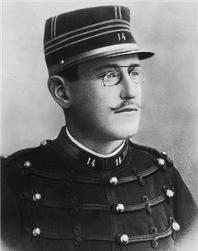Dreyfus Secret File Released
 Some number of years ago I wrote a lengthy blog post on France’s Dreyfus Affair — a post I was proud of at the time, but seems to have fallen like a tree in a depopulated forest — arguing that the Dreyfus Affair could stand to get more mileage as a metaphor for a judicial system run amok. As I explained in the post, “[t]he Dreyfus Affair is a story about an egregious abuse of the legal system, driven primarily by a powerful current of French antisemitism and by a desire to shield the French military from its own mistakes. It involves procedurally flawed court-martials, secret evidence, conspiracies, theft of government secrets, deportation to a brutal island prison, leaks to the press, leak prosecutions, riots by antisemitic mobs, and a cover-up and whitewash perpetrated at the highest levels of the French military.”
Some number of years ago I wrote a lengthy blog post on France’s Dreyfus Affair — a post I was proud of at the time, but seems to have fallen like a tree in a depopulated forest — arguing that the Dreyfus Affair could stand to get more mileage as a metaphor for a judicial system run amok. As I explained in the post, “[t]he Dreyfus Affair is a story about an egregious abuse of the legal system, driven primarily by a powerful current of French antisemitism and by a desire to shield the French military from its own mistakes. It involves procedurally flawed court-martials, secret evidence, conspiracies, theft of government secrets, deportation to a brutal island prison, leaks to the press, leak prosecutions, riots by antisemitic mobs, and a cover-up and whitewash perpetrated at the highest levels of the French military.”
Without recapping the entire story — you can read my post for a synopsis — briefly what happened is that the French military, on discovering evidence of a spy in its midst passing information to the Germans, railroaded a Jewish artillery captain, Alfred Dreyfus, into a conviction, using secret evidence the existence of which was not revealed to Dreyfus or his counsel. The military then steadfastly refused to overturn the conviction even as it became increasingly clear that someone else was the spy, going so far as to warn the spy to be more careful in the future! It’s hard to make stuff like that up, which is why I think the Dreyfus story makes for a useful allegory.
In any event, there is a new development. The historical department of the French Ministry of Defense has placed the secret file used to convict Dreyfus on the web, on a site located at, interestingly enough, www.affairedreyfus.com. (See NY Times story.) If you read French, you can now see for yourself the sketchy evidence used to convict Dreyfus, and the forgeries used later to maintain that conviction. What’s on the affairedreyfus.com site is transcriptions of the original files, which is good, because the originals (available at the links on the bottom of this page) are difficult to read.
